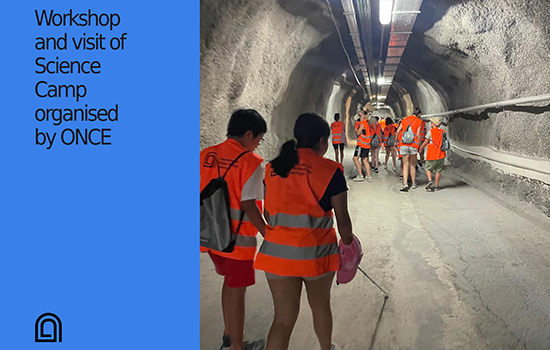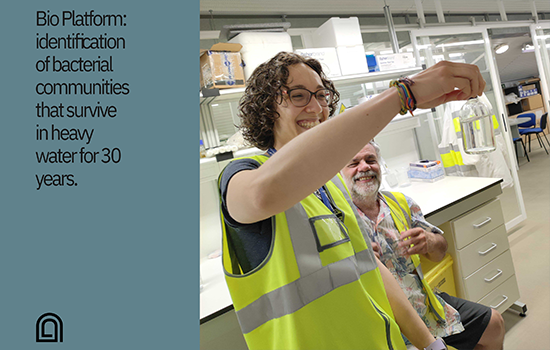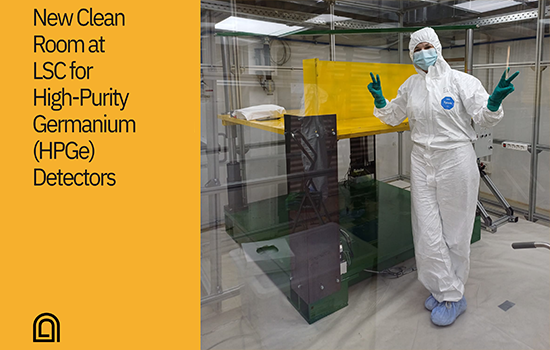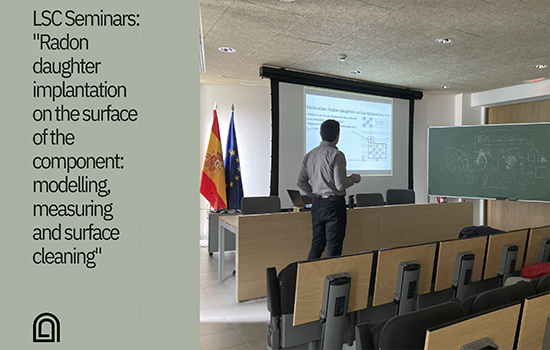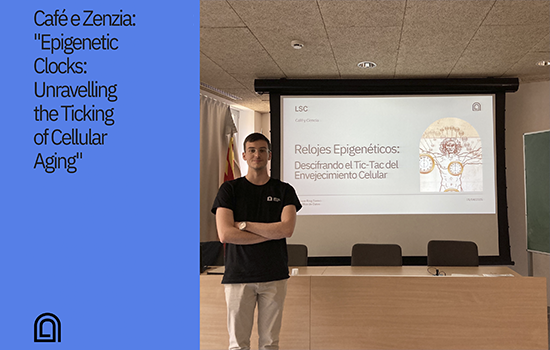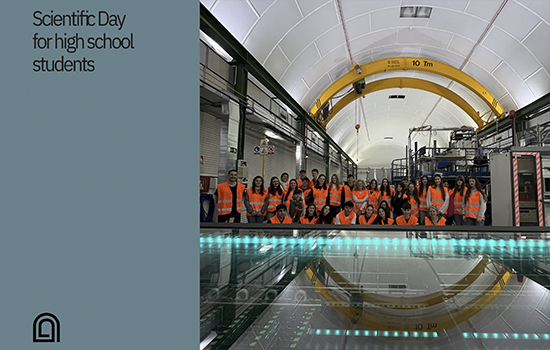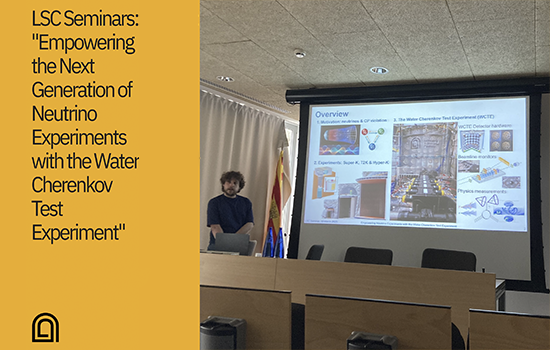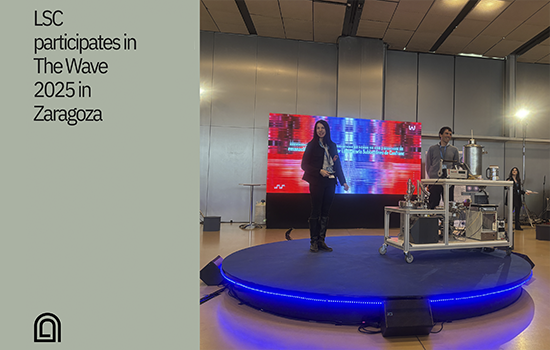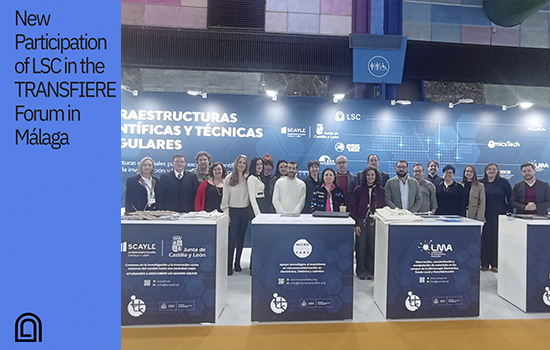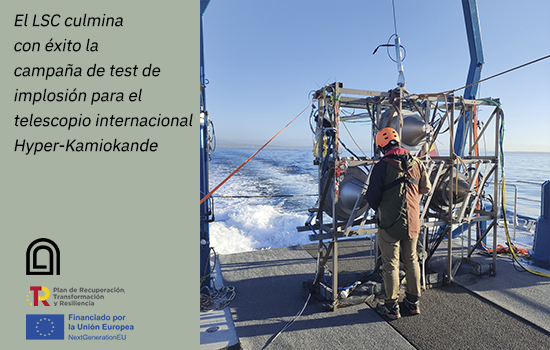July 2025
Workshop and visit of Science Camp organised by ONCE
Last Friday 4th July we had the pleasure of receiving a visit from the children taking part in the summer camps organized by ONCE (Spanish National Organisation for the Blind), which this year focused on Science. During their time at the LSC, our outreach team offered them an introductory workshop about the fascinating world of neutrinos and the detection techniques used in low-background experiments. The day ended with an exciting tour of our underground facilities. Thank you for coming and sharing your curiosity with us!
June 2025
Identification of bacterial communities that survive in heavy water for 30 years
The first article from the collaboration of researchers involved in the heavy water bacteria experiment at the Canfranc Underground Laboratory (LSC) has recently been published. This publication presents the first identification of bacterial communities capable of evolving in an environment considered hostile for most organisms.
May 2025
New Clean Room at LSC for High-Purity Germanium (HPGe) Detectors
In April, we successfully completed the installation of the new Clean Room in Hall C of the underground facility. The design and construction were carried out entirely by our team, and the levels of airborne particles meet the ISO 7 standard, ensuring an ultra-clean and controlled environment. This room already houses one of the lowest-background Germanium detectors and is prepared for the installation of two additional detectors in the coming years.
April 2025
LSC Seminars: “Radon daughter implantation on the surface of the component: modelling, measuring and surface cleaning”
Ali Dastgheibi-Fard, researcher at the Laboratory of Subatomic Physics & Cosmology, presented in his seminar a study on the mechanisms of radon implatation and its impact on detector components. He also discussed methods for measuring, preventing, and cleaning contaminated surfaces, with the goal of reducing background radiation in rare event experiments. This type of research is key to improving the sensitivity of detectors used in astroparticle physics.
Café e Zenzia: “Epigenetic Clocks: Unravelling the Ticking of Cellular Aging”
At the LSC, we organize informal talks where our staff share the progress of their research, always accompanied by a coffee. On April 1st, our colleague Enrique Roig presented the latest advances from his PhD thesis on cellular aging, focused on the development of an epigenetic clock, a bioinformatics tool capable of predicting age based on methylation patterns. Bioinformatics is beginning to make its way into experiments at the LSC.
March 2025
Scientific Day for high school students
On March 26, the LSC held its Science Day for the second year in a row, welcoming students from the 2nd year of Bachillerato from schools in Jaca. Throughout the day, students took part in various workshops and learned about key techniques used at the LSC, such as copper electroforming and gamma spectroscopy. As in the previous edition, the day concluded with a visit to our underground facilities.
LSC Seminars: “Empowering the Next Generation of Neutrino Experiments with the Water Cherenkov Test Experiment”
Nicholas Prouse, a researcher at Imperial College London , presented in his seminar the Water Cherenkov Test Experiment (WCTE), which began collecting data at the end of 2024 in the CERN T9 beam. The data collected by WCTE will be used to improve pion reconstruction in water Cherenkov detectors and to analyze interaction cross-sections using a known particle flux. The results of this experiment will have a direct impact on Super-K, T2K, and Hyper-K.
LSC participates in The Wave 2025 in Zaragoza
On March 19, the LSC participated in The Wave conference, held at the Zaragoza Conference Center, where we conducted a workshop on radon, given the national interest in this topic and our expertise in its air monitoring and the measurement of its emanation in materials. In its second edition, The Wave brought together experts and companies for three days to explore how to transform technology into a real competitive advantage.
New Participation of LSC in the TRANSFIERE Forum in Málaga
From March 12 to 14, the LSC participated in TRANSFIERE, Spain's most important R&D&I fair, held in Málaga. This forum connects the entire Spanish innovation ecosystem and boosts its international projection, promoting the transfer of scientific and technological knowledge. Together with 11 other ICTS, we showcased the services we offer, reaffirming our commitment to maximizing the impact of research on society.
February 2025
Successful Hyper-Kamiokande implosion test campaign
The LSC successfully completes the implosion test campaign, in collaboration with SOCIB, for the validation of protective covers for the photosensors of the international neutrino telescope Hyper-Kamiokande.


